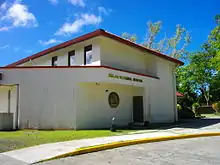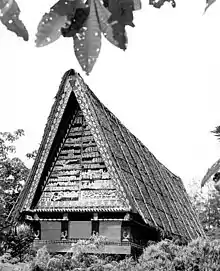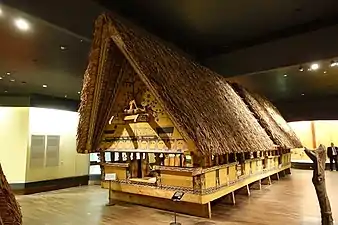Belau National Museum
The Belau National Museum (BNM), previously Palau Museum, is a museum in Koror, Palau. It is the oldest continuously run museum in Micronesia.
 | |
Former name | Palau Museum |
|---|---|
| Established | 1955 |
| Location | Koror, Palau |
| Coordinates | 7°20′11″N 134°28′34″E |
| Type | National museum |
| Director | Olympia E. Morei-Remengesau |
| Website | www.belaunationalmuseum.net |
History
The museum was established in 1955.[1] It is the oldest continually running museum in Micronesia; initially called Palau Museu, it later changed its name.[2] The original founders included Palauans Indalecio Rudimch, Francisco Morei, Alphonso Oiterong and anthropologist Francis M Mahoney.[2] Originally located in the former Japanese Administration Weather Bureau, the museum was later relocated to a new building, which was funded by the Government of the Republic of China.[3] From 1955 until its location move in 1970, the museum was run by a Museum Committee.[1] In 1970 the museum was relocated to a two-storey building in Palau Botanical Garden.[1]
In 1973 the museum's administrative structure changed to a non-profit organisation governed by a board of trustees.[1]
Building
The museum has two exhibition spaces, an air-conditioned photographic archive, offices and shop.[1] As of 2006, the first floor exhibition space displayed Palau's traditional culture and arts, including bead money (udoud) and the house-buying ceremony known as ocheraol.[4]
In the wider museum compound is a library of over 5000 books relating to the history and culture of Palau.[5] There is also a statute of Harruo Remeliik, the first president of Palau.[4]
Collections
The museum exhibits artefacts from all aspects of the local life of Palauan people, such as artworks, photography, sculptures etc.[6] However, according to Philip Dark, due to a lack of security in the museum, by 1988 several important objects had been stolen.[1]
In 1988 the collection consisted of over 1,000 objects relating to the historical, anthropological and biological histories of the country.[1] There are several hundred images in the photographic collection, many of which are from periods of Japanese and German colonial occupation.[5] This archive was an important aspect of a research project undertaken in the mid-2000s to document life under Japanese colonial rule.[7] In 2003 the media collection underwent a digitisation programme, funded by a U.S. Institute of Museum and Library Services (IMLS) National Leadership Grant.[8]
The museum has also been active in recording Palau's intangible cultural heritage, including taro production.[9] As part of the museum's acquisition process, makers of works that are being accessioned into the collection are interviewed and the process of making is recorded.[10]
In 2017 the museum's natural science department led a survey of bird life at the world heritage site of the Rock Islands' southern lagoon.[11] The same year the museum signed a memorandum of understanding with the National Museum (Prague) to deepen scientific relations between the countries.[12]
Bai
In 1969 a traditional village meeting house known as a bai, was constructed in order to showcase and preserve traditional building styles and skills. However it burnt down on 13 October 1979.[1] In the early 1990s the bai was rebuilt using traditional methods and is a key feature of the museum today.[4]
Gallery
 Reconstructed bai (2007)
Reconstructed bai (2007) Details on the bai
Details on the bai Interior of the bai
Interior of the bai The first bai, c.1970s
The first bai, c.1970s
Overseas collections
Due to legacies of colonialism, important aspects of Palauan heritage are held in collections overseas. These include; recordings of traditional music held at the Berliner Phonogramm-Archiv,[13] chiefly costume held at Glasgow Museums,[14] pandanus fibre mats from Sonsorol at National Museums Scotland.[15] They also include Palauan material from the eighteenth century held in the British Museum: an inlaid, bird-shaped wooden bowl, an oil painting and an inlaid canoe, amongst others.[16][17]
In 2005 digital assets of field recordings made in Palau in the 1960s were repatriated to the museum.[18]
Gallery of Palauan cultural heritage held overseas
 Bai at Ethnological Museum, Berlin
Bai at Ethnological Museum, Berlin%252C_19th-early_20th_century%252C_Metropolitan_Museum_of_Art.jpg.webp) Dilukai from the Caroline Islands, Belau (Palau), 19th-early 20th century, Metropolitan Museum of Art
Dilukai from the Caroline Islands, Belau (Palau), 19th-early 20th century, Metropolitan Museum of Art Sea urchin spine necklace, Staatlichen Museums für Völkerkunde München
Sea urchin spine necklace, Staatlichen Museums für Völkerkunde München Storyboards, National Museum Ethnology, Osaka
Storyboards, National Museum Ethnology, Osaka_-_DSC04977.JPG.webp) Alaskan and Palauan objects in National Museum of Finland.
Alaskan and Palauan objects in National Museum of Finland.
Notable people
- Faustina K. Rehuher-Marugg (1979 - 2009).[19]
- Olympia E. Morei-Remengesau (2009 to present).[20][21][22][23]
References
- Dark, Philip J.C. (1988). "Museums in Micronesia". Pacific Arts Newsletter (26): 12–20. JSTOR 23408934.
- Kiste, Robert C.; Marshall, Mac (1999-01-01). American Anthropology in Micronesia: An Assessment. University of Hawaii Press. ISBN 978-0-8248-2017-6.
- Iitaka, Shingo (2019). "Positionality of East Asian Anthropologists in Pacific Studies". Japanese Review of Cultural Anthropology. 20 (2): 227–235. doi:10.14890/jrca.20.2_227.
- Hollywood, Mike (2006). Papa Mike's Palau Islands Handbook. iUniverse. ISBN 978-0-595-37607-0.
- Hezel, Francis X. (3 April 2015). "From the Archives: Resources on Micronesia". The Journal of Pacific History. 50 (2): 213–223. doi:10.1080/00223344.2015.1046212. S2CID 164292923.
- "Belau National Museum & Bai". Lonely Planet. Retrieved 20 July 2018.
- 三田, 牧; Maki, Mita (20 October 2009). "SER no.087; Introduction". 国立民族学博物館調査報告 [Senri Ethnological Reports] (in Japanese). 87. doi:10.15021/00001107.
- Mad, Imengel (27 May 2003). Palau Community College-Belau National Museum image archives digitization and access project. Proceedings of the 3rd ACM/IEEE-CS joint conference on Digital libraries. p. 406. doi:10.1109/JCDL.2003.1204924. ISBN 978-0-7695-1939-5.
- Ngiralmau, Meresbang (1993). Ferentinos, L (ed.). Taro Research in Palau Since 1990. Proceedings of the Sustainable Taro Culture for the Pacific Conference. Sustainable Taro Culture for the Pacific Conference. pp. 110–111. hdl:10125/4274.
- Putt, Neal (June 2001). "Heritage conservation in the Pacific Islands". Studies in Conservation. 46 (sup1): 61–72. doi:10.1179/sic.2001.46.Supplement-1.61. S2CID 218661728.
- OLSEN, ALAN R., and MILANG EBERDONG. "Survey of the Non-Migratory Birds of the Rock Islands Southern Lagoon World Heritage Site in Palau." Micronesica 3 (2017): 1-6.
- Muzeum, Národní. "National Museum and Belau National Museum signed the memorandum of understanding". National museum. Retrieved 2021-10-02.
- Diettrich, Brian (2016). "Chelitakl: Ongeatel Tekoi er a Belau er a Angaramong / Frühe Tonbandaufnahmen aus Palau / Early Reel-to-Reel Recordings from Palau/Sound Memories of Past Palau: Music in Belau 1965-1966/15 Favorite Japanese-Influenced Palauan Songs / Derrebechesiil". Yearbook for Traditional Music. 48: 232–233, 251. doi:10.5921/yeartradmusi.48.2016.0232. ProQuest 1849629619.
- Haddow, Eve (2014). Glasgow Museum: Caroline Islands Collection (PDF). National Museums Scotland.
- Haddow, Eve (2014). National Museum Scotland: Caroline Islands Collection (PDF). National Museum Scotland.
- Nero, Karen L. (2017). "A Tale of Three Time Travelers: Maintaining Relationships, Exploring Visual Technologies". Changing Contexts, Shifting Meanings. pp. 296–312. doi:10.1515/9780824860141-021. ISBN 978-0-8248-6014-1.
- "Collections Online | British Museum". www.britishmuseum.org. Retrieved 2021-10-02.
- Salvatore, Cecilia Lizama (2018-01-17). Cultural Heritage Care and Management: Theory and Practice. Rowman & Littlefield. ISBN 978-1-4422-7218-7.
- "Faustina Rehuher-Marugg Appointed as Minister of Community and Cultural Affairs by ROP President". Belau National Museum - Ngesechel a Cherechar. 2009. Archived from the original on 2018-09-09. Retrieved 2021-10-01.
- "Staff - Belau National Museum". www.belaunationalmuseum.net. Retrieved 2021-10-01.
- "MPTF Informal Economies Recovery Project - Partner Spotlight". www.ilo.org. 2021-06-06. Retrieved 2021-10-01.
- Fadiman, Maria G.; Thomas, Michael B.; Morei, Olympia E.; Kitalong, Ann H.; Hanser, Sholeh (4 October 2018). "Globalization and Tradition in Palau: Case Study of the Syncretic Omengat (First Child Birth) and Ngasech Ceremonies". The Florida Geographer. 50.
- "MOA Signed Between Belau National Museum and Ministry of Natural Resources, Environment, and Tourism | SPC-R2R". www.pacific-r2r.org. Retrieved 2021-10-01.